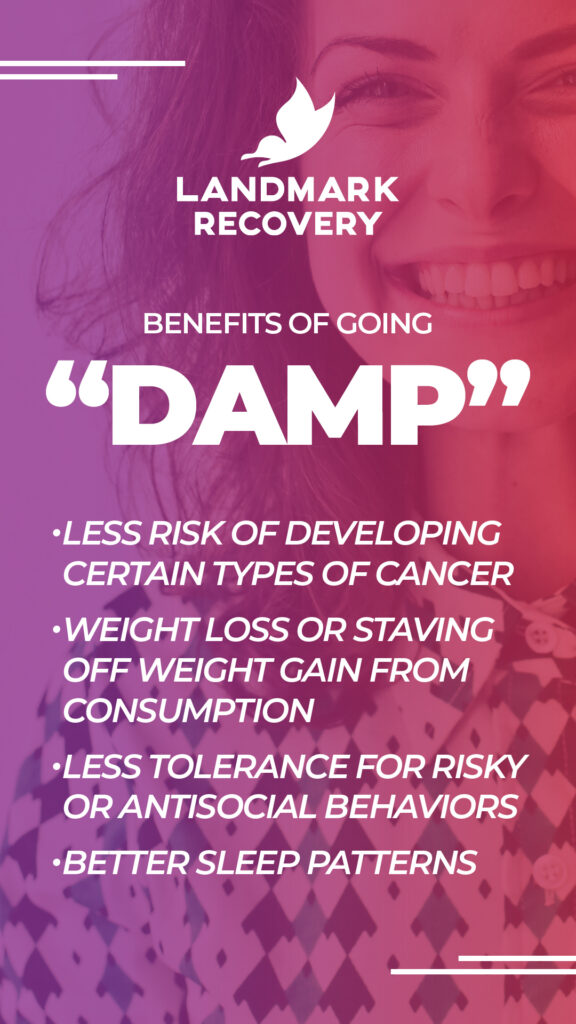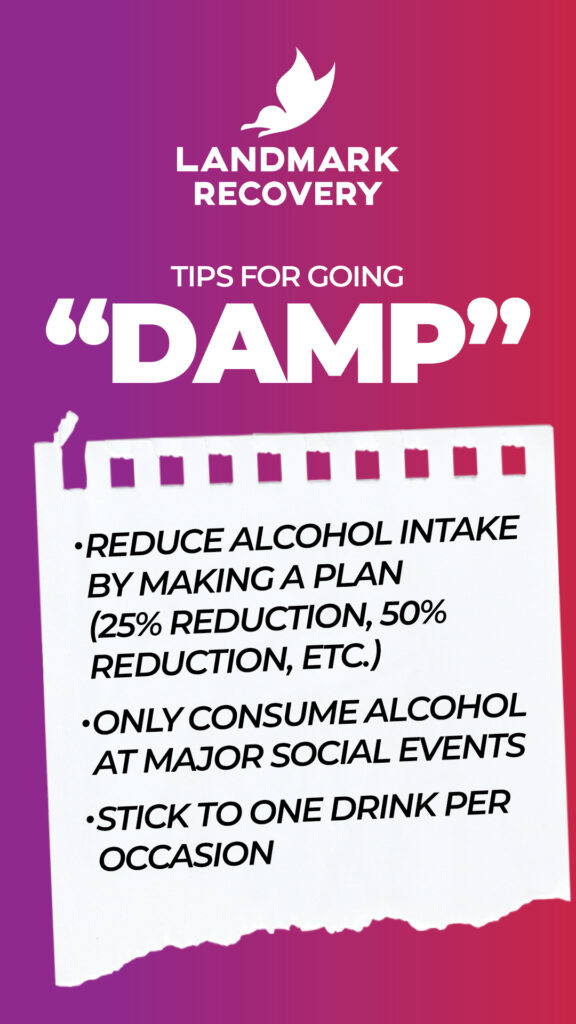Living a “damp” lifestyle is essentially the same thing as drinking in moderation. The aim is to moderate your drinking if you don’t want to completely cut alcohol out of your life. If mindful moderation, or going damp, is something you choose to pursue, it’s best to track your consumption and develop a plan to decrease your alcohol consumption throughout the week, month, or year. It’s a feel-good experiment in achieving wellness that doesn’t hurt to give a shot!
What Does Going Damp Mean?
Going damp is simply taking a mindful approach to drinking alcohol rather than binge drinking or abstaining. People who are “damp drinking” consume alcohol in moderation, often having just one or two drinks a week. Some people attempt to go damp in order to assess their relationship with alcohol and determine if they need to seek addiction treatment.
The damp trend is not the same thing as participating in Dry January or Sober October, which are both initiatives to encourage people to go without a drink for a whole month to see what it’s like. The difference between doing damp and going dry is that when you go damp you continue to drink in moderation, whereas going dry means you don’t drink alcohol at all.
A damp lifestyle is the pursuit of conscious moderation in order to bring incremental positive changes to your health and life. The element of deliberateness and mindfulness in pursuit of being a healthier person is what sets the damp lifestyle apart from basic moderation.
@hana.elson lots of new ppl since I’ve made one of these! So here’s another explanation of what “damp lifestyle” means to me now 🙂 #damplifestyle #balanced #drinkingculture
What Are the Benefits of Not Drinking?
Hana Danly, the influence that coined the term “damp,” had a list of things to recount about immediate benefits of moderating her alcohol consumption.
“Once I started working on my relationship with drinking, I started noticing so many domino effects,” Danly said. “Drinking less, mental health goes up. Mental health goes up, I have more energy, I’m sleeping more, I’m working out more, my skin’s better, I’m happier, I’m more confident in social settings, etc.”
Living a life with less drinking almost immediately begins to feel better, especially when hangovers become a thing of the past. It’s true that those who refrain from heavy alcohol consumption may be able to claim several benefits:
- Less risk of developing certain types of cancer
- Weight loss or staving off weight gain from consumption
- Less tolerance for risky or antisocial behaviors
- Better sleep patterns

How Is Heavy Drinking Bad?
According to the Centers for Disease Control (CDC), binge drinking is defined as consuming 5 or more drinks on an occasion for men or 4 or more drinks on an occasion for women. Heavy drinking is defined as consuming 15 or more drinks per week for men and 8 or more drinks per week for women. Both drinking patterns are referred to as excessive. Binge drinking doesn’t mean that you have an alcohol use disorder, as most of those who binge drink on occasion don’t binge alcohol regularly. However, binge drinking is the most common form of excessive alcohol use in the United States, with one in six adults binging alcohol at least once a year. Those between 18 and 34 years old are the most susceptible to binge drinking patterns.
The Mayo Clinic states that heavy drinking patterns can lead to a variety of health issues over time as a result:
- Elevated risk for breast, mouth, throat, esophagus, and liver cancer
- Pancreatitis
- Cardiovascular issues
- High blood pressure
- Liver disease
- Suicidal ideation
- Pregnancy issues
- Alcohol withdrawals
Ways to Change Alcohol Consumption
There are some interesting ways you can change your alcohol consumption while still enjoying life. Some people choose to replace their consumption with beverages like creative alcohol-free mocktails. Some of those who are living a damp lifestyle are spreading out a few drinks across the week instead of consuming multiple beverages in one sitting. This appears to be a healthier alternative, especially in people who might be more susceptible to hangovers and want to cut that part of their lives out.
How to Go Damp
If you’re looking for alternatives to alcohol when going damp, consider some of our mocktail recipes. Mocktails are a great way to stick to something non-alcoholic when you want something more complex than a regular beverage, such as water, soda, or tea.
Here are some tips for going damp:
- Reduce alcohol intake by making a plan (25% reduction, 50% reduction, etc.)
- Only consume alcohol at major social events
- Stick to one drink per occasion

Learn More
To learn more about the addiction treatment that Landmark Recovery offers for those who have trouble breaking the habit of excessive drinking, give us a call today at 888-448-0302. Our dedicated admissions specialists can help you get the treatment you need. We’re on a mission to save a million lives in the next century.

Choose Recovery Over Addiction
We're here 24/7 to help you get the care you need to live life on your terms, without drugs or alcohol. Talk to our recovery specialists today and learn about our integrated treatment programs.




